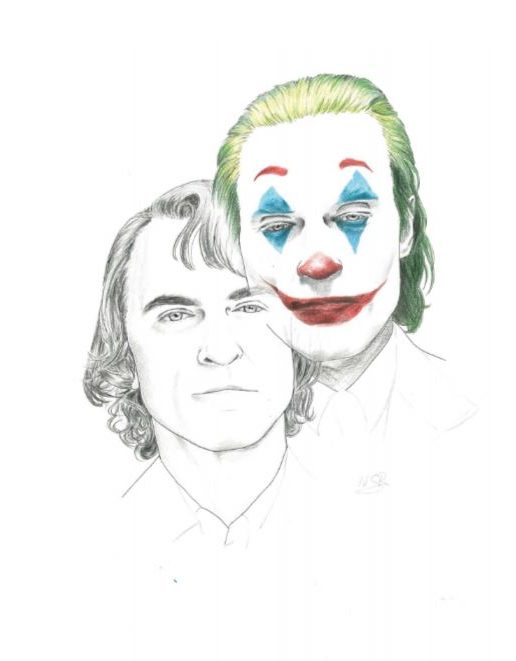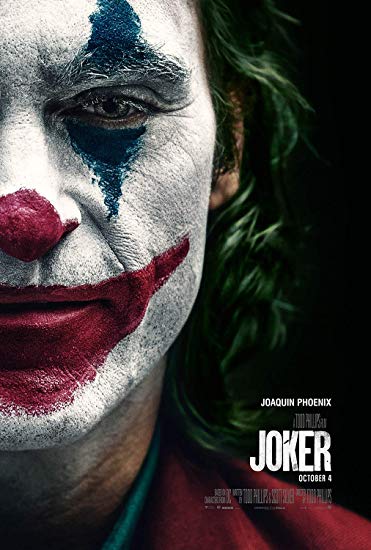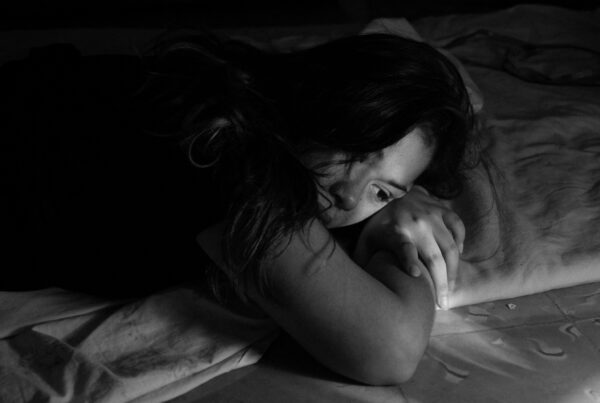
No movie has recently stirred up quite the debate like Todd Phillips’ Joker. Numerous articles have been written about the movie, long before it came out. The general outline of these articles is that Joker is a dangerous movie. Some people even argued that the movie should have never been made. What is all the fuss about? Is this movie truly dangerous, and if so, is it for the reasons that have been brought up by critics?
No movie has recently stirred up quite the debate like Todd Phillips’ Joker. Numerous articles have been written about the movie, long before it came out. The general outline of these articles is that Joker is a dangerous movie. Some people even argued that the movie should have never been made. What is all the fuss about? Is this movie truly dangerous, and if so, is it for the reasons that have been brought up by critics?

Illustration: Nina Kollof
Joker tells us the story of Arthur Fleck, a middle-aged man living with his frail mother, whilst trying to make a living working as a clown. Fleck’s life has been tragic, and in the movie we see him getting increasingly rejected and bullied. This eventually leads to him becoming the well-known supervillain, the Joker, whom most will recognize from the version iconically portrayed by Heath Ledger, in the movie The Dark Knight.
The biggest criticism Joker has met, is based on the idea that justifying violence as a determined outcome of living a life full of hardship sets a toxic example. This example would be especially dangerous for what is believed to be the most vulnerable group among the movie’s audience: young white men who are dealing with these feelings of exclusion themselves. Critics argue that Joker may inspire these individuals to use violence as a way to take revenge on a society that has cast them aside as weirdos for their whole lives. A lot has been said about the idea that violent movies or tv-shows might generate violence in its viewers, but research on this shows mixed results. Implying that Joker might cause violence thus seems like a precarious thing to do.
The fact that exclusion and discrimination lead to feelings of injustice, resentment and an overall sense of failure, which in turn harbors anger and grudge, seems to be a valid point to be made. It is thus not this topic on which Joker is missing the mark. The fact that Fleck is an outcast becomes clear a few minutes into the movie: his uncontrollable laughter, him living with his mother and his job as a failed clown all seem to contribute to the fact that he is laughed at by society. But what is the point of giving the audience a glimpse of a certain psychiatric history that he is carrying with him? We see him meeting with social services and taking a whole bunch of pills, but we’re never told what exactly is going on with Fleck.
“Do the seven pills that Fleck takes daily actually do something for him, or are they just there to underscore the image of a psychiatric patient?”
It would appear that mental illness is used as a means to an end: with Fleck suffering from some kind of psychiatric disorder, or maybe even multiple, the movie makes it seem inevitable that he turns mad at a certain point. Every single person who bought a ticket to see Joker, knew how it was going to end: with the birth of the Joker, a heartless anti-hero with no feelings of
remorse.
It is exactly this use of psychiatric disorders that does not feel quite right. It seems to justify the pathway that is laid out for Fleck, that of a mad man who has been triggered one too many times. Does the mental illness make Fleck a weirdo? Is it for that reason that he is made fun of by people on the streets, his own colleagues and eventually even by Murray Franklin, the famous TV host whom he idolizes?
The use of a non-specific mental illness seems like a bit of a lazy choice: there’s something odd about Fleck, we can all see that, so let’s give him a social worker and a bunch of pills to emphasize the fact that there really must be something wrong with him. We’re made out to believe that Fleck becomes more and more delusional for the duration of the film but on the other hand, it might seem as though some of his delusions are not really delusions. Does his estranged personality stem from the childhood abuse he suffered, or did he inherit this vulnerability from his mother, who is dealing with her own paranoid ideas? Do the seven pills that Fleck takes daily actually do something for him, or are they just there to underscore the image of a psychiatric patient? It feels like an exploitative take on the topic of mental illness, just there to mine drama instead of being properly worked out.
It can, on the other hand, be argued that Phillips is warning us: don’t make fun of people who don’t behave like the rest of society does, for this will lead to a self-fulfilling prophecy. These individuals will start to believe that they are truly as weird as they are made out to be and they will follow up on this. Fleck eventually seems to embrace the fact that he is not like the average American citizen pursuing the American Dream and starts to act upon these feelings of not fitting into society. He doesn’t care if his actions are perceived as weird and ends up using violence to rebel against the people who have been taunting him his whole life.
Something can be said for this warning that the movie is serving us, but it might also be a dangerous thing to suggest that the sum of mental illness plus bullying and exclusion will equal violence. It seems like it is destined to always end up badly when you take an individual suffering from psychological distress and place them at the margins of society. Joker, therefore, might be a dangerous film, but not for reasons that have been called out by most critics. It is not the fact that this movie might inspire violence, but its take on mental illness that seems risky. <<


Illustration: Nina Kollof
Joker tells us the story of Arthur Fleck, a middle-aged man living with his frail mother, whilst trying to make a living working as a clown. Fleck’s life has been tragic, and in the movie we see him getting increasingly rejected and bullied. This eventually leads to him becoming the well-known supervillain, the Joker, whom most will recognize from the version iconically portrayed by Heath Ledger, in the movie The Dark Knight.
The biggest criticism Joker has met, is based on the idea that justifying violence as a determined outcome of living a life full of hardship sets a toxic example. This example would be especially dangerous for what is believed to be the most vulnerable group among the movie’s audience: young white men who are dealing with these feelings of exclusion themselves. Critics argue that Joker may inspire these individuals to use violence as a way to take revenge on a society that has cast them aside as weirdos for their whole lives. A lot has been said about the idea that violent movies or tv-shows might generate violence in its viewers, but research on this shows mixed results. Implying that Joker might cause violence thus seems like a precarious thing to do.
The fact that exclusion and discrimination lead to feelings of injustice, resentment and an overall sense of failure, which in turn harbors anger and grudge, seems to be a valid point to be made. It is thus not this topic on which Joker is missing the mark. The fact that Fleck is an outcast becomes clear a few minutes into the movie: his uncontrollable laughter, him living with his mother and his job as a failed clown all seem to contribute to the fact that he is laughed at by society. But what is the point of giving the audience a glimpse of a certain psychiatric history that he is carrying with him? We see him meeting with social services and taking a whole bunch of pills, but we’re never told what exactly is going on with Fleck.
“Do the seven pills that Fleck takes daily actually do something for him, or are they just there to underscore the image of a psychiatric patient?”
It would appear that mental illness is used as a means to an end: with Fleck suffering from some kind of psychiatric disorder, or maybe even multiple, the movie makes it seem inevitable that he turns mad at a certain point. Every single person who bought a ticket to see Joker, knew how it was going to end: with the birth of the Joker, a heartless anti-hero with no feelings of
remorse.
It is exactly this use of psychiatric disorders that does not feel quite right. It seems to justify the pathway that is laid out for Fleck, that of a mad man who has been triggered one too many times. Does the mental illness make Fleck a weirdo? Is it for that reason that he is made fun of by people on the streets, his own colleagues and eventually even by Murray Franklin, the famous TV host whom he idolizes?
The use of a non-specific mental illness seems like a bit of a lazy choice: there’s something odd about Fleck, we can all see that, so let’s give him a social worker and a bunch of pills to emphasize the fact that there really must be something wrong with him. We’re made out to believe that Fleck becomes more and more delusional for the duration of the film but on the other hand, it might seem as though some of his delusions are not really delusions. Does his estranged personality stem from the childhood abuse he suffered, or did he inherit this vulnerability from his mother, who is dealing with her own paranoid ideas? Do the seven pills that Fleck takes daily actually do something for him, or are they just there to underscore the image of a psychiatric patient? It feels like an exploitative take on the topic of mental illness, just there to mine drama instead of being properly worked out.
It can, on the other hand, be argued that Phillips is warning us: don’t make fun of people who don’t behave like the rest of society does, for this will lead to a self-fulfilling prophecy. These individuals will start to believe that they are truly as weird as they are made out to be and they will follow up on this. Fleck eventually seems to embrace the fact that he is not like the average American citizen pursuing the American Dream and starts to act upon these feelings of not fitting into society. He doesn’t care if his actions are perceived as weird and ends up using violence to rebel against the people who have been taunting him his whole life.
Something can be said for this warning that the movie is serving us, but it might also be a dangerous thing to suggest that the sum of mental illness plus bullying and exclusion will equal violence. It seems like it is destined to always end up badly when you take an individual suffering from psychological distress and place them at the margins of society. Joker, therefore, might be a dangerous film, but not for reasons that have been called out by most critics. It is not the fact that this movie might inspire violence, but its take on mental illness that seems risky. <<




